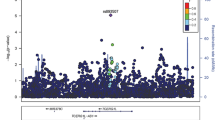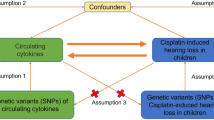Abstract
Ototoxicity is a disabling reaction to cisplatin chemotherapy. Much of the inter-individual variability in the development of hearing impairment among cisplatin-receiving patients has not been fully accounted for. In particular, little is known about the pharmacogenomics of cisplatin-induced ototoxicity. This study sought to investigate the role of variation in five candidate genes in a cohort of South African cancer patients. Five variants within the candidate genes were genotyped in 214 patients, of which SLC22A2 rs316019 and NFE2L2 rs6721961 associated with reduced rates of ototoxicity. In the patients who were exposed to cumulative cisplatin doses ⩾200 mg m−2 (n=113), the variant rs6721961 associated with ototoxicity according to three different grading scales of hearing loss (ASHA, P=0.005; Chang, P=0.028; CTCAE, P=0.004). The NFE2L2 promotor variant rs6721961 may therefore be protective against hearing loss in cisplatin-receiving cancer patients.
This is a preview of subscription content, access via your institution
Access options
Subscribe to this journal
Receive 6 print issues and online access
$259.00 per year
only $43.17 per issue
Buy this article
- Purchase on Springer Link
- Instant access to full article PDF
Prices may be subject to local taxes which are calculated during checkout
Similar content being viewed by others
References
Einarsson EJ, Petersen H, Wiebe T, Fransson PA, Magnusson M, Moëll C . Severe difficulties with word recognition in noise after platinum chemotherapy in childhood, and improvements with open-fitting hearing-aids. Int J Audiol 2011; 50: 642–651.
Kushner BH, Budnick A, Kramer K, Modak S, Cheung NKV . Ototoxicity from high-dose use of platinum compounds in patients with neuroblastoma. Cancer 2006; 107: 417–422.
Whitehorn H, Sibanda M, Lacerda M, Spracklen T, Ramma L, Dalvie S et al. High prevalence of cisplatin-induced ototoxicity in Cape Town, South Africa. S Afr Med J 2014; 104: 288–291.
Bokemeyer C, Berger CC, Hartmann JT, Kollmannsberger C, Schmoll HJ, Kuczyk MA et al. Analysis of risk factors for cisplatin-induced ototoxicity in patients with testicular cancer. Br J Cancer 1998; 77: 1355–1362.
Bertolini P, Lassalle M, Mercier G, Raquin MA, Izzi G, Corradini N et al. Platinum compound-related ototoxicity in children: long-term follow-up reveals continuous worsening of hearing loss. J Pediatr Hematol Oncol 2004; 26: 649–655.
Li Y, Womer RB, Silber JH . Predicting cisplatin ototoxicity in children: the influence of age and the cumulative dose. Eur J Cancer 2004; 40: 2445–2451.
De Jongh FE, Van Veen RN, Veltman SJ, De Wit R, Van der Burg MEL, Van den Bent MJ et al. Weekly high-dose cisplatin is a feasible treatment option: analysis on prognostic factors for toxicity in 400 patients. Br J Cancer 2003; 88: 1199–1206.
Chen WC, Jackson A, Budnick AS, Pfister DG, Kraus DH, Hunt MA et al. Sensorineural hearing loss in combined modality treatment of nasopharyngeal carcinoma. Cancer 2006; 106: 820–829.
Yancey A, Harris MS, Egbelakin A, Gilbert J, Pisoni DB, Renbarger J . Risk factors for cisplatin-associated ototoxicity in paediatric oncology patients. Pediatr Blood Cancer 2012; 59: 144–148.
Choeyprasert W, Sawangpanich R, Lertsukprasert K, Udomsubpayakul U, Songdej D, Unurathapan U et al. Cisplatin-induced ototoxicity in paediatric solid tumours: the role of glutathione S-transferases and megalin genetic polymorphisms. J Pediatr Hematol Oncol 2013; 35: 138–143.
Kirkim G, Olgun Y, Aktas S, Kiray M, Kolatan E, Altun Z et al. Is there a gender-related susceptibility for cisplatin ototoxicity? Eur Arch Otorhinolaryngol 2014; 272: 2755–2763.
Ross CJ, Katzov-Eckert H, Dubé MP, Brooks B, Rassekh SR, Barhdadi A et al. Genetic variants in TPMT and COMT are associated with hearing loss in children receiving cisplatin chemotherapy. Nat Genet 2009; 41: 1345–1349.
Oldenburg J, Kraggerud SM, Cvancarova M, Lothe RA, Fossa SD . Cisplatin-induced long-term hearing impairment is associated with specific glutathione s-transferase genotypes in testicular cancer survivors. J Clin Oncol 2007; 25: 708–714.
Riedemann L, Lanvers C, Deuster D, Peters U, Boos J, Jürgens H et al. Megalin genetic polymorphisms and individual sensitivity to the ototoxic effect of cisplatin. Pharmacogenomics J 2008; 8: 23–28.
Spracklen TF, Whitehorn H, Vorster AA, Ramma L, Dalvie S, Ramesar RS . Genetic variation in Otos is associated with cisplatin-induced ototoxicity. Pharmacogenomics 2014; 15: 1667–1676.
Xu H, Robinson GW, Huang J, Lim JY, Zhang H, Bass JK et al. Common variants in ACYP2 influence susceptibility to cisplatin-induced hearing loss. Nat Genet 2015; 47: 263–266.
Yang JJ, Lim JYS, Huang J, Bass J, Wu J, Wang C et al. The role of inherited TPMT and COMT genetic variation in cisplatin-induced ototoxicity in children with cancer. Clin Pharmacol Ther 2013; 94: 252–259.
Lanvers-Kaminsky C, Malath I, Deuster D, Ciarimboli G, Boos J, Am Zehnhoff-Dinnesen AG . Evaluation of pharmacogenetic markers to predict the risk of cisplatin-induced ototoxicity. Clin Pharmacol Ther 2014; 96: 156–157.
Hagleiter MM, Coenen MJ, Patino-Garcia A, de Bont ES, Gonzalez-Neira A, Vos HI et al. Influence of genetic variants in TPMT and COMT associated with cisplatin induced hearing loss in patients with cancer: two new cohorts and a meta-analysis reveal significant heterogeneity between cohorts. PLoS One 2014; 9: e115869.
Dolan ME, Newbold KG, Nagasubramanian R, Wu X, Ratain MJ, Cook EH Jr et al. Heritability and linkage analysis of sensitivity to cisplatin-induced cytotoxicity. Cancer Res 2004; 64: 4353–4356.
Pussegoda K The pharmacogenomics of cisplatin-induced hearing loss. M.Sc thesis, The University of British Columbia: Vancouver, Canada, 2012..
American Speech-Language-Hearing Association. Audiologic management of individuals receiving cochleotoxic drug therapy, 1994. Available at: http://www.asha.org/policy (accessed 22 October 2014).
Chang KW, Chinosornvatana N . Practical grading system for evaluating cisplatin ototoxicity in children. J Clin Oncol 2010; 28: 1788–1795.
National Cancer Institute. Common Terminology Criteria for Adverse Events (CTCAE) version 4.03, 2015. Available at: http://evs.nci.nih.gov/ftp1/CTCAE/CTCAE_4.03_2010-06-14_QuickReference_5x7.pdf (accessed 11 March 2015).
So H, Kim H, Kim Y, Kim E, Pae HO, Chung HT et al. Evidence that cisplatin-induced auditory damage is attenuated by downregulation of pro-inflammatory cytokines via Nrf2/HO-1. J Assoc Res Otolaryngol 2008; 9: 290–306.
Aleksunes LM, Goedken MJ, Rockwell CE, Thomale J, Manautou JE, Klaassen CD . Transcriptional regulation of renal cytoprotective genes by Nrf2 and its potential use as a therapeutic target to mitigate cisplatin-induced nephrotoxicity. J Pharmacol Exp Ther 2010; 335: 2–12.
Jin J, Li M, Zhao Z, Sun X, Li J, Wang W et al. Protective effect of Wuzhi tablet (Schisandra sphenanthera extract) against cisplatin-induced nephrotoxicity via Nrf2-mediated defense response. Phytomedicine 2015; 22: 528–535.
Kim SJ, Ho Hur J, Park C, Kim HJ, Oh GS, Lee JN et al. Bucillamine prevents cisplatin-induced ototoxicity through induction of glutathione and antioxidant genes. Exp Mol Med 2015; 47: e142.
Hou X, Bai X, Gou X, Zeng H, Xia C, Zhuang W et al. 3',4',5',5,7-pentamethoxyflavone sensitises cisplatin-resistant A549 cells to cisplatin by inhibition of Nrf2 pathway. Mol Cells 2015; 38: 396–401.
Marzec JM, Christie JD, Reddy SP, Jedlicka AE, Vuong H, Lanken PN et al. Functional polymorphisms in the transcription factor NRF2 in humans increase the risk of acute lung injury. FASEB J 2007; 21: 2237–2246.
Marzack ED, Marzec JM, Zeldin DC, Kleeberger SR, Brown NJ, Pretorius M et al. Polymorphisms in the transcription factor NRF2 and forearm vasodilator responses in humans. Pharmacogenet Genomics 2012; 22: 620–628.
Suzuki T, Shibata T, Takaya K, Shiraishi K, Kohno T, Kunitoh H et al. Regulatory nexus of synthesis and degradation deciphers cellular Nrf2 expression levels. Mol Cell Biol 2013; 33: 2402–2412.
Ungvári I, Hadadi E, Virág V, Nagy A, Kiss A, Kalmár A et al. Relationship between air pollution, NFE2L2 gene polymorphisms and childhood asthma in a Hungarian population. J. Community Genet 2012; 3: 25–33.
Sampath V, Garland JS, Helbling D, Dimmock D, Mulrooney NP, Simpson PM et al. Antioxidant response genes sequence variants and BPD susceptibility in VLBW infants. Pediatr Res 2015; 77: 477–483.
von Otter M, Landgren S, Nilsson S, Celojevic D, Bergström P, Håkansson A et al. Association of Nrf2-encoding NFE2L2 haplotypes with Parkinson's disease. BMC Med Genet 2010; 11: 36.
Todorovic M, Newman JR, Shan J, Bentley S, Wood SA, Silburn PA et al. Comprehensive assessment of genetic sequence variants in the antioxidant 'master regulator' NRF2 in idiopathic Parkinson's disease. PLoS One 2015; 10: e0128030.
Filipski KK, Mathijssen RH, Mikkelsen TS, Schinkel AH, Sparreboom A . Contribution of organic cation transporter 2 (OCT2) to cisplatin-induced nephrotoxicity. Clin Pharmacol Ther 2009; 86: 396–402.
Ciarimboli G, Deuster D, Knief A, Sperling M, Holtkamp M, Edemir B et al. Organic cation transporter 2 mediates cisplatin-induced oto- and nephrotoxicity and is a target for protective interventions. Am J Pathol 2010; 176: 1169–1180.
Kang HJ, Song IS, Shin HJ, Kim WY, Lee CH, Shim JC et al. Identification and functional characterisation of genetic variants of human organic cation transporters in a Korean population. Drug Metab Dispos 2007; 35: 667–675.
Song IS, Shin HJ, Shim EJ, Jung IS, Kim WY, Shon JH et al. Genetic variants of the organic cation transporter 2 influence the disposition of metformin. Clin Pharmacol Ther 2008; 84: 559–562.
Song IS, Lee do Y, Shin MH, Kim H, Ahn YG, Park I et al. Pharmacogenetics meets metabolomics: discovery of tryptophan as a new endogenous OCT2 substrate related to metformin disposition. PLoS One 2012; 7: e36637.
Lanvers-Kaminsky C, Sprowl JA, Malath I, Deuster D, Eveslage M, Schlatter E et al. Human OCT2 variant c.808G>T confers protection effect against cisplatin-induced ototoxicity. Pharmacogenomics 2015; 16: 323–332.
Girotto G, Vuckovic D, Buniello A, Lorente-Cánovas B, Lewis M, Gasparini P et al. Expression and replication studies to identify new candidate genes involved in normal hearing function. PLoS One 2014; 9: e85352.
Shukla SJ, Duan S, Badner JA, Wu X, Dolan ME . Susceptibility loci involved in cisplatin-induced cytotoxicity and apoptosis. Pharmacogenet Genomics 2008; 18: 253–262.
Acknowledgements
We thank the NRF and MRC SA for funding this research, and Sr Gameda Benefeld for recruitment of the patient cohort.
Author information
Authors and Affiliations
Corresponding author
Ethics declarations
Competing interests
The authors declare no conflict of interest.
Rights and permissions
About this article
Cite this article
Spracklen, T., Vorster, A., Ramma, L. et al. Promoter region variation in NFE2L2 influences susceptibility to ototoxicity in patients exposed to high cumulative doses of cisplatin. Pharmacogenomics J 17, 515–520 (2017). https://doi.org/10.1038/tpj.2016.52
Received:
Revised:
Accepted:
Published:
Issue Date:
DOI: https://doi.org/10.1038/tpj.2016.52
This article is cited by
-
Genetic variation of cisplatin-induced ototoxicity in non-cranial-irradiated pediatric patients using a candidate gene approach: The International PanCareLIFE Study
The Pharmacogenomics Journal (2020)
-
The genetic vulnerability to cisplatin ototoxicity: a systematic review
Scientific Reports (2019)
-
Age-corrected hearing loss after chemoradiation in cervical cancer patients
Strahlentherapie und Onkologie (2018)



